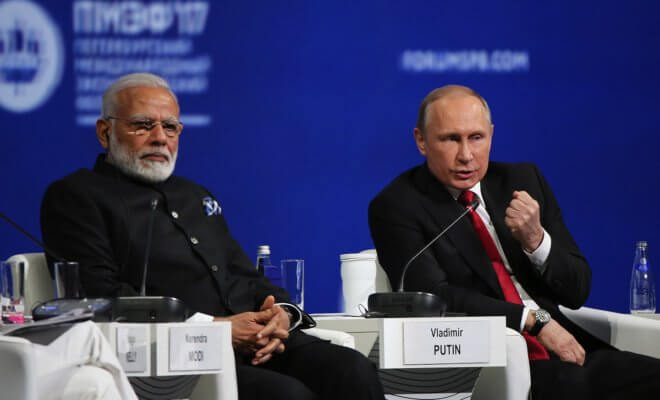Business
India Caught in US-Russia Crossfire

Russian President Vladimir Putin (right) gestures as he speaks while Indian Prime Minister Narendra Modi looks on during the St. Petersburg International Economic Forum in Saint Petersburg, Russia.
Photo Credit: Bloomberg photo by Andrey Rudakov.
U.S. officials have declined to make any promises about what would happen if India went ahead with the S-400 purchase.
When the United States enacted a series of sanctions in retaliation for Russia’s alleged interference in American elections, the goal was to punish an adversary, not to penalize friends.
But that is exactly what could happen as India – a country which the United States has sought to cultivate as a strategic partner – moves ahead with a major $5 billion weapons purchase from Moscow.
On Friday, during an official visit by Russian President Vladimir Putin to New Delhi, India signed a contract to buy five S-400 Triumf antiaircraft missile systems from Russia.
In theory, such a transaction will expose Indian entities and officials to U.S. sanctions under the Countering America’s Adversaries Through Sanctions Act. The legislation, which was passed last year, mandated penalties for countries doing significant business with Russia’s defense and intelligence sectors.
Now the crucial question is whether President Donald Trump will grant a waiver to India for the purchase of the S-400. Last month, the United States imposed sanctions on an arm of the Chinese military for buying Russian fighter planes as well as equipment for the S-400.
The United States and India have drawn closer in recent years as both countries cast a wary eye on China’s growing influence in the region. But the tussle over the Russian missile system represents a case of conflicting priorities.
From the U.S. perspective, the sanctions regime is a necessary and appropriate response to Russian meddling in the American elections – and Washington expects allies to assist in that effort.
India, meanwhile, is keen to deepen ties with the United States but not at the cost of severing a long-standing defense relationship with Russia. More broadly, it wants the independence to determine its own approach to countries like Iran and China, where its interests may differ substantially from those of the United States.
India “cannot be put in a position where, in effect, Washington decides what kind of relationship they have with these other countries,” said Ashley Tellis, a former senior Bush administration official and longtime India expert. “That’s where Delhi will draw a bright red line.”
Russia is India’s largest arms supplier, a relationship that dates back to the Cold War. Between 2013 and 2017, Russia accounted for 62 percent of India’s arms imports, according to the Stockholm International Peace Research Institute.
That percentage is declining, however, as India ramps up defense cooperation with the United States. The United States is now the second-biggest supplier of arms to India: it sells 15 percent of such imports, up from next to nothing only a decade ago. Last month the two countries signed a major military accord which will allow India to receive state-of-the-art communications equipment from the U.S.
Now the purchase of the Russian missile system will “test the resilience of the relationship between the U.S. and India,” said C. Uday Bhaskar, a security expert and director of the Society for Policy Studies in New Delhi. The arms purchase is not the only area of friction: the United States is also pushing India to reduce or eliminate its purchase of Iranian oil before it reimposes sanctions on Tehran next month.
In recent weeks, U.S. officials have declined to make any promises about what would happen if India went ahead with the S-400 purchase. The intent of the U.S. sanctions law is “to impose costs on Russia for its malign behavior,” not to “impose damage to the military capabilities of our allies or partners,” according to a statement from the U.S. Embassy in New Delhi.
However, there are “strict criteria” for receiving waivers from sanctions and they will be considered on a “transaction-by-transaction basis,” it added.
The two countries have a little time to hash things out: the U.S. sanctions kick in when India starts paying for the missile systems, not from the time a deal is reached, experts said. The U.S. president also has the ability to delay the imposition of sanctions if he determines such purchases are being “substantially” reduced. Other countries will be watching closely: Vietnam and Indonesia, which also make significant arms purchases from Russia, could find themselves in the same predicament as India.
(c) 2018, The Washington Post

You must be logged in to post a comment Login